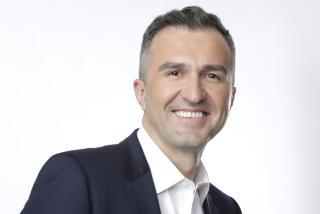Iraq Blast Injures ABC News Co-Anchor
BAGHDAD — Just weeks into his stint as a globe-trotting co-anchor of ABC News, Bob Woodruff was seriously injured Sunday along with his cameraman when the Iraqi army vehicle in which they were traveling hit a roadside bomb.
Woodruff and cameraman Doug Vogt were traveling with an Iraqi unit attached to the U.S. Army’s 4th Infantry Division near Taji, 12 miles north of Baghdad, when they were wounded. Woodruff’s assignment was part of a closely watched effort by ABC News to energize its second-place broadcast with on-the-ground reports from its new anchor team.
Both men were standing up in a rooftop hatch of an Iraqi personnel carrier at the time. Although they were wearing full body armor and Kevlar helmets, their injuries included shrapnel wounds to the head. Woodruff suffered upper-body injuries as well.
They were taken by helicopter to a U.S. military hospital in Balad, to the north, where they underwent surgery for their wounds. Late Sunday, ABC News President David Westin said Woodruff and Vogt, along with an ABC producer, were being flown to medical facilities in Landstuhl, Germany, and would arrive this morning.
ABC said the two men were in serious but stable condition. “We take this as good news, but the next few days will be critical,” Westin said in a statement.
Lt. Col. Barry Johnson, a U.S. military spokesman, said he knew of no other casualties in the attack.
Woodruff, 44, was named co-anchor of ABC’s “World News Tonight” with Elizabeth Vargas last month to replace Peter Jennings, who died of lung cancer in August. Since then, he has spent much of his time reporting from international hot spots such as Tehran and Jerusalem.
On Sunday evening, Vargas anchored the newscast alone. She closed the broadcast with a message about her colleagues, calling them “two of the very best in this business.”
Woodruff and Vogt arrived in Iraq on Friday after spending two days in Israel covering the Palestinian elections and had planned to be there through Tuesday.
They had been traveling Sunday with the 4th Infantry in an armored Humvee but then decided to switch to an Iraqi vehicle, ABC’s senior White House correspondent, Martha Raddatz, told George Stephanopoulos on “This Week” Sunday morning, according to a transcript released by the network.
Iraqi forces have borne the brunt of insurgent attacks, and their equipment often lacks sufficient armor plating. More than 4,000 Iraqi police and soldiers have been killed since March 2003.
The two journalists were in the first of a group of vehicles with their heads exposed above the hatch, Raddatz said. The explosion was followed by small-arms fire, she said.
Mohammed Amir, 22, a grocery shop owner, said he saw three or four military vehicles, including U.S. Humvees, at the time of the attack.
“We saw the fire rising from one vehicle, and then two medical choppers evacuating the casualties,” he said. “We closed our shops and left the place because we were afraid of being arrested by the Americans. The U.S. forces closed the Baghdad-Mosul road since then.”
The Taji area, a flat agricultural region that is also home to a gas refinery, has been the scene of several insurgent attacks in recent months, including the downing of a U.S. helicopter and the hijacking of a busload of 31 would-be Iraqi police recruits two weeks ago. The recruits had failed to pass muster and were on their way home when insurgents kidnapped the men and shot them to death execution-style.
Sunday’s attack underscored the dangers facing journalists working in Iraq. Kidnappers abducted Christian Science Monitor freelance reporter Jill Carroll and killed her interpreter, Allan Enwiyah, 32, on Jan. 7. Carroll’s fate was unknown Sunday.
Last week, an Iraqi cameraman for Baghdad TV, Mahmoud Zaal, was killed in Ramadi during a battle between U.S. forces and insurgents, witnesses said.
Since the U.S.-led invasion in March 2003, 37 journalists have been abducted in Iraq and 61 have been killed, the Committee to Protect Journalists says.
Raddatz said Woodruff and Vogt were experienced journalists who were careful while traveling in Iraq. “I have worked with Doug Vogt so many times. He is no hot dog,” she said. She added that Woodruff was not a risk-taker, either.
Although the attack underscored the risks of reporting in Iraq, ABC News spokesman Jeffrey Schneider said the network had no intention of cutting back its coverage of the war.
“That it is a dangerous place is something we have known for a long time,” he said. “That it is a very important place for us to continue to cover is of no doubt to anybody.”
Other television broadcasters concurred. “Covering the war in Iraq, and the dangers faced by U.S. and Iraqi forces, brings with it its own unique hazards,” NBC anchor Brian Williams said in a statement. “There is no way to cover the story in Iraq without exposure to danger.”
Some journalists are expressing reluctance about entering the war zone, however. Last year, Richard Gizbert, a former ABC correspondent based in London, sued the network, saying he had been fired because he refused assignments in Afghanistan and Iraq.
In December, a British employment tribunal upheld his complaint. The network disputes his claim and is appealing.
Woodruff, a native of the Detroit suburb of Birmingham, studied Chinese while attending law school at the University of Michigan.
After a year as a corporate lawyer in New York, he took a leave of absence to move to Beijing and teach law. During the Tiananmen Square uprising in 1989, CBS hired him as an interpreter, and he began to rethink his career choice.
“I discovered that I could scratch my wanderlust itch and get paid for it, which was a remarkable revelation,” he said in an interview last month.
Upon returning to the U.S., he made an amateur test reel and sent it unsolicited to news directors. A station in Redding in Northern California called.
After less than a year there, he was hired in the early 1990s by affiliates in Richmond, Va., and Phoenix before ABC asked him to join its affiliate service in 1996.
A posting at the Justice Department followed, and then at ABC’s London bureau. Woodruff spent two years traveling in that job, mostly covering U.S. operations in Afghanistan and Iraq.
When he and Vargas were named Jennings’ successors, he expressed relief that the format of an anchor team would allow them to keep a foot in reporting.
“What’s good for the viewers is good for us personally,” Woodruff said. “One of the fears that Peter expressed to me over the years was that once you get to this chair, once you get to this position, you’re not able to go out to the big stories and the things you’ve always loved your whole life as a journalist to do.”
He and his wife, Lee, a freelance journalist, have four children, ages 5 to 14.
Vogt, 46, has worked with ABC News for more than 15 years, covering events in Europe, Asia and the Middle East. He was born in Alberta, Canada, and now resides in Aix-en-Provence, France, with his wife, Vivian, and their three daughters.
*
Gold reported from New York and Moore reported from Baghdad. Special correspondents in Baghdad, Kirkuk and Taji contributed to this report.
More to Read
The biggest entertainment stories
Get our big stories about Hollywood, film, television, music, arts, culture and more right in your inbox as soon as they publish.
You may occasionally receive promotional content from the Los Angeles Times.










